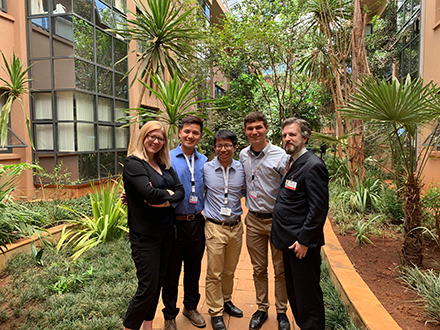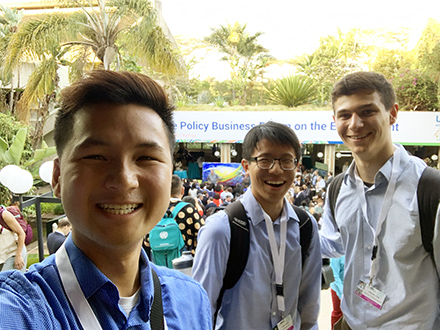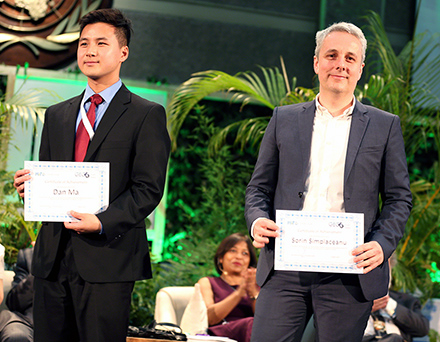 UC Berkeley undergrads Caleb Wright and Charles Yang at the U.N. Environmental Assembly in Kenya. (Photo courtesy of Charles Yang)
UC Berkeley undergrads Caleb Wright and Charles Yang at the U.N. Environmental Assembly in Kenya. (Photo courtesy of Charles Yang)Berkeley engineers propose solutions for reaching U.N. development goals

From left to right: Liz Nichols (Foreign affairs officer and AAAS fellow), Dan Ma, Charles Yang, Caleb Wight and Seth Vaughn (environmental advisor at the U.S. State Department)
Last year, three UC Berkeley undergrads won a competition co-hosted by the MIT Climate CoLab and the United Nation’s Environment Program (UNEP), which sought ideas for achieving the U.N.’s sustainable development goals by 2030.
The only undergraduate team in the competition, they ultimately beat out 69 other teams to take first place. In March, with support from Berkeley Engineering, the trio attended the U.N. Environmental Assembly (UNEA) in Kenya and saw their proposal included in the 2030 Agenda for Sustainable Development.
We recently talked to the team — Dan Ma (environmental economics and policy), Caleb Wright (mechanical engineering) and Charles Yang (materials science and engineering/electrical engineering and computer sciences) — about their proposal, the trip to Africa and how engineering can help the U.N. achieve its sustainability goals.
Can you tell us more about your proposal?
Charles: We competed in the contest called Exploring Synergistic Solutions for Sustainable Development 2018. The U.N. has established sustainable development goals to end poverty, protect the planet and ensure prosperity for all. To meet this challenge, the U.N. Environment program was looking for a creative combination of initiatives to help meet these goals. They challenged us to select and combine actions from over 2,000 preexisting proposals on the Climate CoLab platform.
Our proposal focused specifically on community development. Instead of simply developing technical proposals and then inserting them into communities, we sought to integrate solutions into communities in an equitable manner.
Dan: We’re proposing technologies and techniques that allow communities to develop their own small-scale infrastructure. Like developing an energy and waste management system, so that human waste can be processed for biogas power, building microgrids to distribute electricity and supporting community-developed agriculture in and just outside urban spaces to feed large populations of people. We also suggest integrating these farming practices with educating people about sustainable food production.
How did you come up with this idea to compete?
 From left to right: Dan Ma, Charles Yang and Caleb Wright in Kenya for the U.N. Environmental Assembly. (Photo courtesy of Charles Yang)
From left to right: Dan Ma, Charles Yang and Caleb Wright in Kenya for the U.N. Environmental Assembly. (Photo courtesy of Charles Yang)
Dan: I was talking to my alumni mentor, Jessica Huang (B.S.’08 CEE), about some of my interests in sustainability and sustainable development. She told me about this competition and encouraged me to submit something.
Charles and Caleb were in my Math 54 discussion group. I told them I wanted to submit something to the competition, and they were interested, so we became a team.
Charles: I think all of us were already interested in sustainable development and fighting climate change. We were individually going about it in our different ways, in our different majors and fields, until Dan brought this opportunity to us.
Caleb: Before coming to college, I was interested in finding out how I could apply engineering to large issues like climate change. So when Dan and Charles approached me with the idea to submit a report for this competition, I thought it would be a great way to learn more and begin understanding how I could apply myself to real issues.
What was it like to be at a U.N. conference in Kenya?
Charles: One of the things that surprised me about Kenya was the diversity of the cultures, languages and food. In many ways, the western world homogenizes Africa, so it was interesting to see what Kenya was really like on the ground.
We often think of the United States as the pinnacle of modernization, but Kenya is leapfrogging us in many ways. One thing that stood out to me was the widespread use of M-Pesa, which is a digital payment system created by mobile network providers, the U.S. equivalent of Venmo through Verizon. We were were the only ones who used cash or credit cards, while everyone else around us just used an app to pay for transactions.
Caleb: It was interesting to speak with recent college graduates working at the U.N. and the delegates from the U.S. State Department and Environmental Protection Agency. It was eye-opening to see the different career paths that people take to end up working in the U.N. on environmental issues. It was great to see people from STEM and the social sciences work together toward this common goal of mitigating climate change.
Dan: We also met two different Berkeley alums at the conference. One was Brennan Van Dyke, Director of Science Division of UNEP, who got a B.A. at Cal. It was cool to see former Berkeley students take up positions at the U.N. I just thought — Berkeley is everywhere!
 UC Berkeley student Dan Ma (left) receives a certificate of recognition for winning the competition co-hosted by MIT Climate CoLab and the United Nations Environment Program. (Photo courtesy of Charles Yang)How did this experience influence your plans for the future?
UC Berkeley student Dan Ma (left) receives a certificate of recognition for winning the competition co-hosted by MIT Climate CoLab and the United Nations Environment Program. (Photo courtesy of Charles Yang)How did this experience influence your plans for the future?
Caleb: Since submitting this proposal, I’ve been engaging a lot with the ideas presented in our proposal by taking classes on sustainable and ethical development work and juggling those concepts with the work that I’ve been doing for Engineers Without Borders on campus. Attending UNEA has made me rethink how I can integrate the technical skills I am learning in my coursework with larger scale policy reform and has motivated me to look for opportunities outside of what I would consider traditional engineering roles.
I think most importantly, participating in discussions about environmental sustainability at the global level has helped me realize that many of the issues related to climate change affect us in our own communities and affect people we know daily. I would urge students from all academic backgrounds that are interested in getting involved in environmental sustainability to look critically at their own communities and see how climate change and environmental pollution is affecting the health, opportunities and well-being of certain groups disproportionately within their community, because that’s where I feel we can all make the biggest impact.
Dan: It really inspired me to look more at the community development level of sustainability work. For a long time, I thought I wanted to work in a high-level policy making capacity to help mitigate the effects of climate change. But from this experience, I’ve learned that there is a lot of work that can be done on the ground with communities.
Charles: Being able to travel to another continent, meeting people from all of these different countries and seeing first-hand how the U.N. works was really eye-opening for me. I don’t think I would go into the U.N. as a career, but it did inform my understanding about how decisions are made internationally. It was also interesting to see how the technical work that we do here at Berkeley affects policy and impacts the work that the U.N. and other governing bodies do.